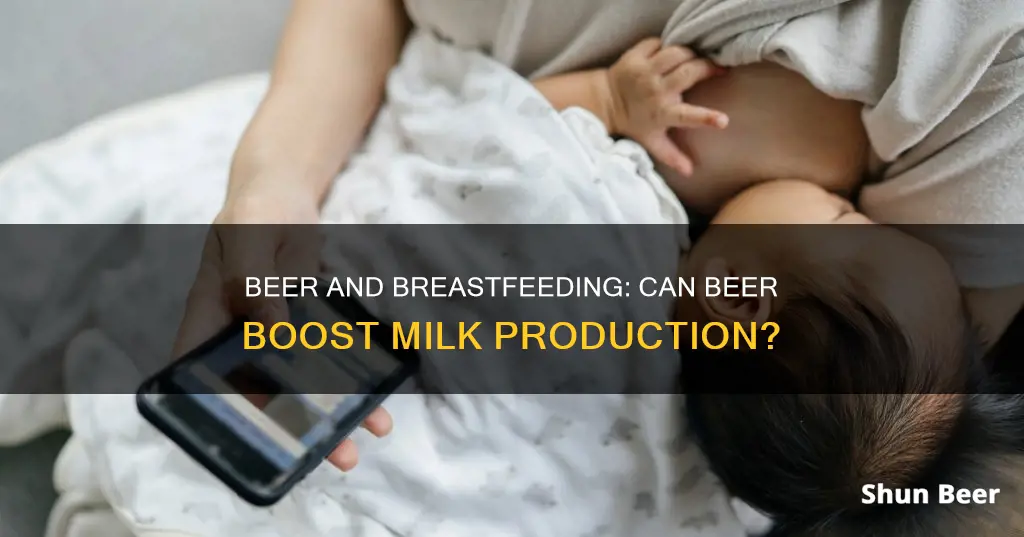
Drinking beer while breastfeeding is a topic that has been widely discussed and debated. While some sources claim that beer, especially stout, can increase milk production in breastfeeding mothers, others suggest that there is no direct link between the two. It is important to note that the American Academy of Pediatrics (AAP) does not recommend drinking alcohol while breastfeeding, as alcohol itself does not increase milk production. However, there is evidence that the polysaccharide carbohydrates found in beer, such as barley and hops, may have a positive impact on milk production, but these are also present in non-alcoholic beer. The consumption of beer or other alcoholic beverages during lactation remains a controversial topic, and it is always advisable for mothers to consult with healthcare professionals for personalized advice.
| Characteristics | Values |
|---|---|
| Can drinking beer help milk production? | No, beer is not a galactagogue. |
| Folk wisdom | Drinking beer, especially a stout, can help increase milk production. |
| Scientific studies | There is some evidence that the polysaccharide carbohydrates found in beer, such as barley and hops, do increase milk production. |
| Alternative | The same polysaccharides are also found in non-alcoholic beer. |
| Other galactagogues | Plant products like fenugreek, Coleus amboinicus Lour (Mexican mint), or palm dates do, in fact, appear to increase milk production. |
| Brewer's yeast | Brewer's yeast is an ingredient in a lot of lactation cookies and other lactation foods. |
| Alcohol consumption | The American Academy of Pediatrics (AAP) does not recommend drinking alcohol while breastfeeding. |
| Safe alcohol consumption | The CDC recommends waiting a minimum of two hours after drinking before breastfeeding. |
What You'll Learn

Beer is not a galactagogue
While there is some evidence that the polysaccharide carbohydrates found in beer, such as barley and hops, do increase milk production, these are also found in non-alcoholic beer. Therefore, beer is not a galactagogue.
The American Academy of Pediatrics (AAP) does not recommend drinking alcohol while breastfeeding, and alcohol itself does not increase milk production or help mothers to breastfeed. In fact, studies have shown that infants consumed significantly less milk during the testing sessions in which their mothers drank alcoholic beer compared to when the mothers drank non-alcoholic beer. This decrease in milk intake was not due to a decrease in the number of times the babies fed.
It is important to note that alcohol does enter breast milk within 30-60 minutes, and the CDC recommends waiting a minimum of two hours after drinking before breastfeeding. Alcohol from three drinks will still be detected in breast milk six to eight hours later, and pumping and discarding the milk during this time won't change that.
While it is generally considered safe for breastfeeding mothers to occasionally consume alcohol in moderation, it is important to drink responsibly and always prioritize the safety and well-being of the baby.
Lexapro and Alcohol: Is It Safe to Drink Beer?
You may want to see also

The American Academy of Pediatrics does not recommend drinking alcohol while breastfeeding
The American Academy of Pediatrics (AAP) does not recommend drinking alcohol while breastfeeding. The AAP advises that breastfeeding mothers should wait at least 2 hours after drinking before nursing their babies. This allows alcohol levels in the breast milk to decrease. If a mother cannot wait to feed her infant, she can use previously expressed milk.
The AAP states that reasonable alcohol intake should not be discouraged, and that very little alcohol is transferred to breast milk. However, the AAP recommends waiting 4 hours after drinking an alcoholic beverage before breastfeeding. This will give the body time to rid itself of the alcohol.
The AAP's advice is based on the fact that alcohol can be harmful to an infant's development, growth, and sleep patterns. Alcohol can also impair a mother's judgment and ability to care for her child safely. Excessive alcohol consumption can lead to decreased milk production and shortened breastfeeding duration.
While the AAP does not recommend drinking alcohol while breastfeeding, it is important to note that moderate alcohol consumption (up to one drink per day) is not known to be harmful to the infant. However, drinking alcoholic beverages is not a reason to stop breastfeeding.
The AAP's guidance is aimed at ensuring the safety and well-being of both the mother and the child.
A Refreshing Summer: Beer and Watermelon Pairing
You may want to see also

Barley and hops in beer increase milk production
For centuries, women have been advised to drink beer to increase their milk supply. Beer companies even marketed low-alcoholic beers as tonics to stimulate women's appetites, increase their strength, and enhance their milk yield.
While beer consumption does not help mothers breastfeed, there is some evidence that the polysaccharide carbohydrates found in beer, such as barley and hops, do increase milk production. These are also found in non-alcoholic beer.
Brewers' yeast is also believed to increase milk production, and is an ingredient in many lactation cookies and other lactation foods. However, one source notes that there is only a negligible amount of yeast in packaged beers like Guinness.
Wine and Beer: Can You Drink Both?
You may want to see also

Non-alcoholic beer has the same effect
In fact, non-alcoholic beer may be preferable to alcoholic beer for mothers looking to increase their milk supply. This is because the alcohol in beer inhibits the milk ejection reflex, causing babies to consume less milk. In one study, babies consumed 20% less milk in the first four hours after their mothers drank an alcoholic beer compared to a non-alcoholic one. Another study found that babies consumed less milk after their mothers drank orange juice with alcohol than when their mothers drank non-alcoholic beer.
However, it is important to note that not all mothers respond to beer in the same way. While some mothers report increased milk production and more frequent and stronger let-downs, others notice no difference.
EMS Workers and Alcohol: Can They Drink?
You may want to see also

Brewers yeast is an ingredient in lactation cookies
While beer is not a galactagogue and does not increase milk production, there is some evidence that the polysaccharide carbohydrates found in beer, such as barley and hops, do increase milk production. These are also found in non-alcoholic beer.
Brewer's yeast is a powerful nutritional supplement bursting with B vitamins and iron, which has been shown to increase milk supply. It is also packed with vitamin B, iron, zinc, magnesium, and potassium. It is a good source of protein, with one 1/4 cup serving offering 8 grams of protein. Brewer's yeast is an ingredient in lactation cookies, which are meant to help with milk production.
Lactation cookies are made with other ingredients that are believed to help with milk production, such as oats, flaxseed, and coconut oil. Oats are a rich source of the fiber beta-glucan, which can help boost the lactation-supporting hormone prolactin. Flaxseed is high in phytoestrogens, which may help boost milk supply. Coconut oil is particularly high in lauric acid, an important component of breast milk.
Santa's Favorite Beverage: Beer or Not?
You may want to see also
Frequently asked questions
Yes, drinking beer can help with milk production. The polysaccharide carbohydrates found in beer, such as barley and hops, increase milk production.
Other plant products like fenugreek, Coleus amboinicus Lour (Mexican mint), or palm dates appear to increase milk production.
The American Academy of Pediatrics (AAP) does not recommend drinking alcohol while breastfeeding. However, the CDC notes that an occasional standard-sized drink (12 oz. of 5% beer) won't harm the baby. It is generally fine to have one drink while nursing, and alcohol levels in blood correlate to levels in milk, although they are much lower in milk.
Non-alcoholic beer, brewer's yeast, tincture of hops, and malt are some non-alcoholic alternatives to beer that can help with milk production.
One folk belief is that drinking a stout beer can help increase milk production. Kelly Ripa broached this topic on her show, saying, "If, like, you have a hard time producing breast milk, the doctor will say drink a stout beer."







